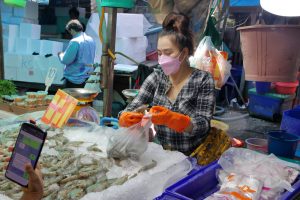Weeks of lockdown have done very little to curb the spread of COVID-19 in Thailand. Daily infections in recent days have breached the 20,000 mark, with a new high of 23,418 cases recorded on August 13. The kingdom’s total case count is now nearing 1 million while the country’s total death toll yesterday reached 8,285. Against the backdrop of rising cases and deaths, disparities between the rich and the poor are becoming increasingly apparent.
The widening gap is most clearly manifested in vaccine inequality. So far, less than 30 percent of the population has received at least one dose of COVID-19. This falls significantly short of the government’s “70 percent by October” target. The slow national rollout is rooted in vaccine shortages and Thailand’s early-stage failure to diversify vaccine supplies beyond AstraZeneca and Sinovac. The wealthy, however, are living in a different world. Many celebrities and well-funded individuals have traveled overseas to search for their preferred vaccines.
Now that the Delta variant is raging, people are frantically looking for mRNA booster doses. Limited amounts of Pfizer vaccines – supplied by the Biden Administration – are now being distributed to frontline medical workers and high-risk groups. While these shots are not officially distributed to the general public, there are rumors of VIPs receiving preferential treatment. Meanwhile, private hospitals are offering – at a cost – bookings for Moderna vaccines. The first batch of Moderna vaccine is expected to arrive during the fourth quarter of this year.
In Thailand, infections among family members are widespread. This is not surprising, considering that it is common to see several generations living together in one household. For obvious reasons, however, the virus is much more transmissible among unvaccinated low-income families. First, the nature of their jobs is usually incompatible with remote working from home. Wage earners in poor households have no choice but to put themselves and their families at risk in order to make a living.
Second, poor families live in homes with little space for social distancing. The government’s home isolation program for asymptomatic patients or those showing mild symptoms may therefore be counterproductive when applied to the poor. Costly private hospital care is also impossible, leaving treatment at public or field hospitals as the only viable option. However, beds are overwhelmingly filled even there.
Given that the mortality rate is highest among the elderly and adults with preexisting health issues, poor children are at serious risk of becoming orphans. The absence of parental care can, in the long run, accelerate social issues such as drug use, teen pregnancy, and child trafficking. Foreseeing these challenges, the Thai government has unveiled schemes including foster care and educational support to the highest academic level to assist COVID-19 orphans. Still, access to these support schemes is limited to orphans who are left totally alone. Children left with incompetent single parents or caregivers are, tragically, excluded from the system.
Food insecurity is another major concern. High-density local markets where ordinary Thais purchase low-priced food and ingredients are, sadly, among the main vectors of community transmission. Notably, the second wave outbreak last December erupted at Mahachai seafood market near Bangkok. Fast forward to the present, many local markets such as the ones in Phuket town are sealed off. This raises worries about access to affordable food sources.
Unlike the wealthy, low-income people cannot routinely afford to pay for food delivery services. Furthermore, the “happiness-sharing pantries” campaign – creatively introduced since the beginning of the pandemic – to share food to the poor is, unfortunately, being forgotten. With a grim COVID-19 outlook ahead, people naturally prioritize their own survival over the needs of others.
Inequality is nothing new in Thailand. The 2018 Credit Suisse Global Wealth Report ranked Thailand as the global number one in terms of wealth inequality, overtaking Russia and India. And, to be fair, the pandemic has affected everyone in Thailand in some way. Large enterprises such as the Minor Group and Thai AirAsia have suffered huge financial losses. Thai AirAsia, traditionally one of the most well-equipped domestic airlines, made the decision earlier this month to ground all flights and defer paying salaries until September. COVID-19 has also claimed the lives of well-known executives including Narong Chokwatana of the Saha Group, Thailand’s top consumer goods conglomerate.
But, as illustrated by recent developments, COVID-19 has greatly exacerbated the country’s preexisting inequalities. Economically marginalized people are now disproportionately more vulnerable to death and permanent hardship. At the same time, voices of dissatisfaction and demands for fairness are growing. The search for remedies to alleviate tensions between the rich and the poor will surely become a bigger headache for the Thai government over the long term.

































